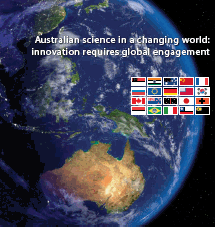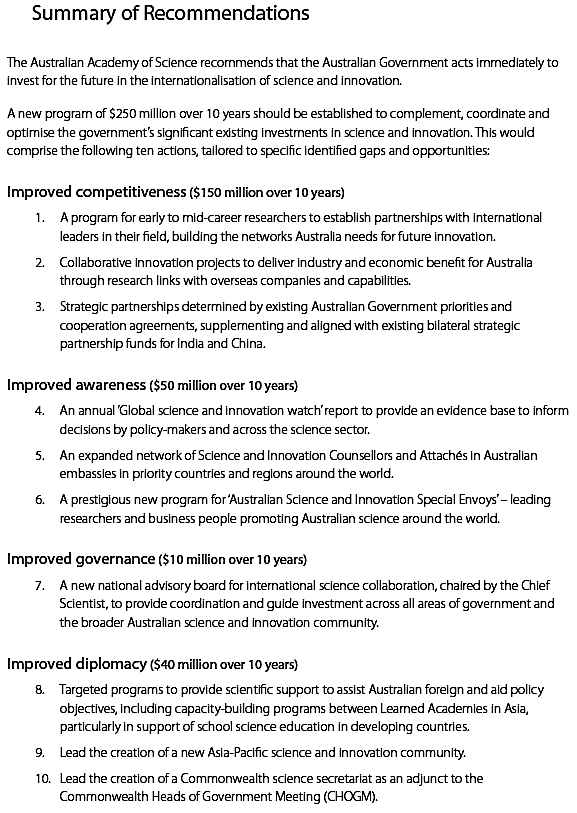|
News & Views item - November 2011 |
![]() AAS Issues a Plea That Australia Not Become a Science Freeloader. (November
22, 2011)
AAS Issues a Plea That Australia Not Become a Science Freeloader. (November
22, 2011)
 The
Australian Academy of Science (AAS) today released a 34-page position paper
Australian science in a changing world: innovation requires global
engagement
The
Australian Academy of Science (AAS) today released a 34-page position paper
Australian science in a changing world: innovation requires global
engagement![]() .
It is introduced by the nation's most recent Nobel Laureate, astrophysicist
Brian Schmidt:
.
It is introduced by the nation's most recent Nobel Laureate, astrophysicist
Brian Schmidt:
Part of Australia continuing to succeed in the rapidly evolving world of science and technology is looking beyond our borders to work cooperatively with colleagues overseas. Increasing our overseas linkages allows Australians to augment their knowledge and skills to help make Australia even more competitive on the world stage.
In an article published on November 17, 2011 in The Conversation physicist Cathy Foley, President of Science and Technology Australia addresses the question of whether Australia is at risk of being perceived as mendicant as regards global scientific research and noting in particular the June 30, 2011 demise of the $10 million per annum International Science Linkages (ISL) program.
In Dr Foley's view: "[W]e should be increasing our investment to a level of $30M a year – not cutting it."
And now the AAS:
The Australian Government’s main program for supporting strategic international science collaboration was terminated in June, 2011. In light... of the relevance of science and technology to shaping our future, reconsideration of our international engagement is urgently required. Australia has a unique opportunity, as both a Western and an Asian nation, to participate strategically in global science and innovation... Australian science and innovation can continue to play an influential role, but will increasingly need to be coordinated with and be cognisant of the efforts of others. This will require investment now by the Australian Government for the future. [What is required is a] new program of $250 million over 10 years [which] represents 0.25% of the Australian Government’s total investment in science, research and innovation over the decade.
The Academy has previously
calculated![]() that funding for strategic international collaboration can provide a rate of
return of 6 to 7 to
that funding for strategic international collaboration can provide a rate of
return of 6 to 7 to
one and if longer-term commercial outcomes and the attraction of international
funding are considered, the leverage approaches a factor of 21. These
multipliers reflect financial value by adding to national research priorities.
It now lists ten recommendations so that Australia can "ensure that it can
maintain its links with leading international science, and continue to maximise
economic and social benefits for the nation... This is the critical decade for
Australia’s links to
the emerging world of the 21st century".
Aaaa, but we have a government spooked by having to deliver an almost immediate budget surplus or it sees itself as having no hope of retaining power after the 2013 election - so bugger the long term good of the nation.
The Australian Academy of Science's
